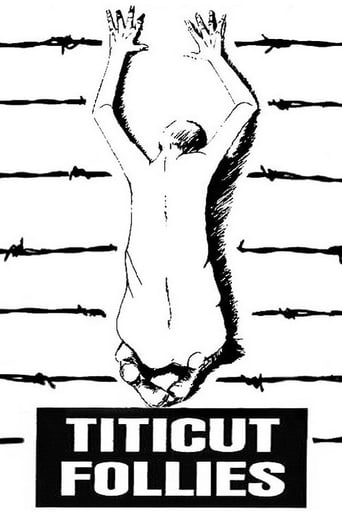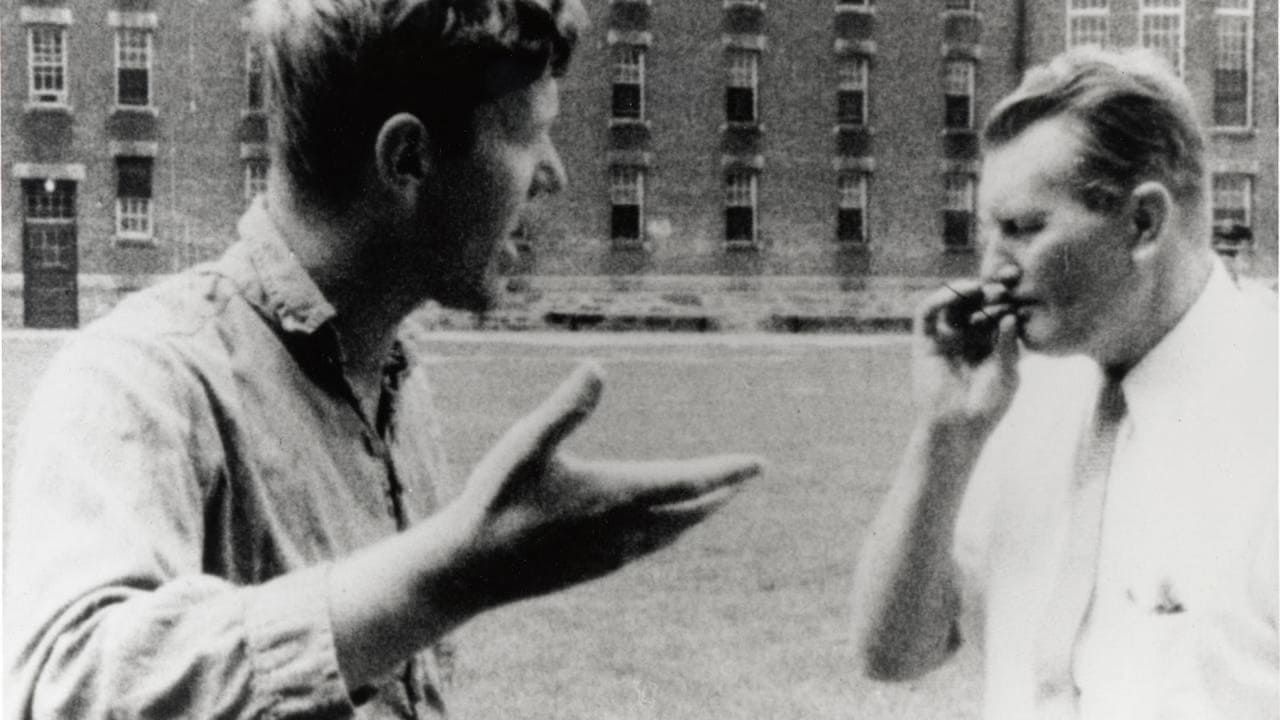yellow-27476
I have been ashamed on being human first in "salo", then watching this movie...It is disturbing watching how they treat with mentally ill people. How they do tube feeding, how they treat them..like an animal..i was so so angry and disappointed..They are mentally ill, but they are human.. To be honest some of them are more clever than us.. More more clever i can say.. This guy- Vladimir, another 2 guys talking about war. And the arrogant doctor.. I hated him so much. It will be better for them to be in prison than here. This movie shows us how wild animal can we be sometimes. and i'm glad that i'm living not in those years.
Coventry
All I ever read about is how disturbing and controversial "Titicut Follies" is, and how the Surpreme Court commanded to ban the film and prevent further distribution because it was (and still is) an embarrassment for the Law in the state of Massachusetts. Okay, it may be disturbing, but it primarily is a truly saddening & depressing documentary that depicts real human beings in some of the most humiliation footage ever shot on camera. The controversial impact of "Titicut Follies" is actually some sort of paradox to itself. One could state that the atrocious and inhumanly cruel behavior of the guards & doctors at the Bridgewater Institution urgently needed to be made public, but on the other hand you could also easily claim that Frederick Wiseman gratuitously spread humiliation footage of defenseless mental patients on a large scale. If you stumbled upon the page of this film, I presume you already know this documentary illustrates in shocking and occasionally painful details how the mental patients at the Massachusetts Bridgewater State Hospital are mistreated and bullied by the staff members. The patients, varying from catatonic people to paranoid and severely suicidal human beings, are humiliated and mocked, resulting in extended images of mentally disabled people shouting and raving around their rooms naked. Wiseman may have had the permission of the patients' relatives and/or their legal guardians to use the footage, but who is he to "exploit" these poor people's lamentable living conditions to make a statement about the contemporary incompetent medical treatment of mental patients? I heavily appreciate this documentary because it caused a huge scandal and undoubtedly influenced the future of medicine in a good way, but maybe the footage never should have left the evidence room of the Supreme Court in Massachusetts. By now "Titicut Follies", in all his uncut and reputedly infamous glory, inevitably is offered on DVD-websites that usually just sell nauseating horror and perverted sleaze films, and the events of this documentary seriously don't belong in this entertainment section. The essence and importance of "Titicut Follies" is actually more reminiscent to the status of Nazi-propaganda films. They're reflections of the black pages in our social history, but by now they're just here to remind us never to go down that road again. No rating from me, because it feels too much like you're judging the real-life misery of defenseless people on a pathetic scale of 1 to 10.
Richard Stiek
This documentary was shot without the knowledge of the senior staff and management of the facility, making the shooting sometimes rather difficult. What is often lost on the modern viewer is the attitude toward the criminally insane and the mentally disturbed at the time. In the 1960s, not many people outside of the psychiatric world knew much of anything about disorders like schizophrenia and sociopathy, and this film gave an insight into the daily patterns of people with these disorders.Also, this film opened some eyes about the treatment of prisoners and of mental patients at the time. There is significant instances of abuse and neglect, including, as stated in the other review, an unsanitary force feeding of a patient who would not eat. It also shows electroshock convulsive therapy (basically putting two electric leads on either temple and sending a shot of electricity through the brain). There is significant nudity and maltreatment by the guards, but there are two things not readily apparent in any of the reviews or promos. First, this is a prison, and all prisoners had to experience some form of nude inspection. Second, this is also a population of mentally disturbed, who may use the clothing to harm themselves or others.As an aside, there are some seriously disturbing scenes including some involving bodily functions. If you have a strong stomach and heart, and you are interested in a reflection of this aspect of society in the 1960s, this documentary is a solid view. There is no soundtrack, and rather than making it seem more distant, I feel it allows you to feel like you are there, able to interpret your own feelings rather than have them influenced by the choice of music of the director / producer. This isn't a film for entertainment, it is educational.
EVOL666
First off - I wouldn't really classify TITICUT FOLLIES as a "documentary" in the classic sense. There are no interviews, no narrator, and there doesn't appear to be any real "slant" to the film. Instead, it is a cold and voyeuristic view into the activities and practices of the inmates and their "caretakers" within a 1960s mental institution...Throughout the film, we get a glimpse of the daily lives of the doctors and nurses, guards, and inmates of the Bridgewater State mental hospital in Massachusettes. We watch as the guards and "patients" interact, and as the patients interact amongst themselves. There doesn't appear to be any real bias to the film, other than to show the conditions that these individuals all coexist in. The hospital seems to be filled with every type of mentally disturbed individual - from pedophiles, to Tourettes sufferers, to schizophrenics to the severely mentally retarded. The camera captures the "action" unrelentingly and in graphic detail.Many find TITICUT FOLLIES "disturbing" due to the treatment of the patients. I for one found most of the guards and doctors to be relatively humane and compassionate, given the circumstances. The only instance I considered to be "abusive" was when one guard taunted an inmate about cleaning his room. He was obviously getting some sort of kick out of upsetting the old man which I found rather sad and sadistic. Of the other scenes in the film, I didn't see any instances of what I would personally consider "physical abuse" - though the living arrangements for the inmates left much to be desired. The inmates were often left in completely bare rooms totally naked. I assume it's so they wouldn't hurt themselves, but it still seemed animalistic. Another key scene that several other reviewers have focused on is the "force-feeding" of an inmate, which while unpleasant, I found to be necessary as it's noted that the person hadn't eaten in three days. At that point, I don't see any other option except to allow the person to starve to death - and I doubt anyone would consider that option all that "humane" either.Unfortunately, these types of mentally disturbed individuals still live in similar circumstances today - having medications forced on them and living in a depressing, nearly comatose state for the majority of their lives in harsh institutions. I personally know people who have spent time in mental and rehabilitation institutions, and from their retelling, it doesn't seem that any great strides have been made in either the care or rehabilitation of those that suffer from serious mental issues. I don't necessarily blame this on the doctors or the facilities involved, as I'm sure that many of them do their utmost to help those that have these afflictions - I just don't think there's adequate knowledge of the human mind to be able to "fix" these individuals.TITICUT FOLLIES is worth seeing to those that appreciate "tough" films - it's definitely not a laugh-a-minute joy-ride. Instead, I think it shows the types of things that all of us knows goes on (even to this day...), and wish didn't...8/10


 AD
AD


